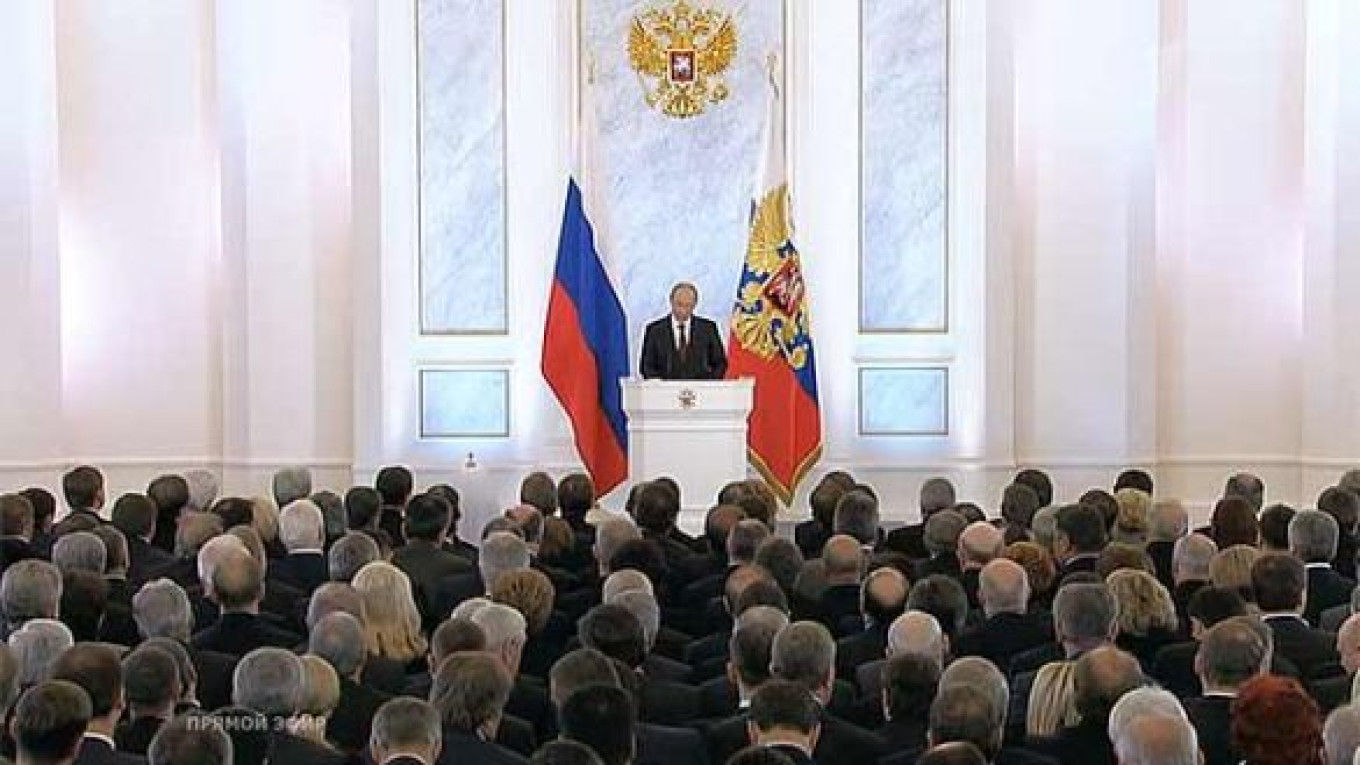President Vladimir Putin expanded Russian vocabulary Wednesday, as he called for “deoffshorization” of the country's economy, a measure he said would help repatriate capital channeled to offshore jurisdictions.
In his state-of-the-nation address, which covered a wide range of economic issues, Putin pushed for agreements with tax havens that would help open up offshore entities and make them disclose their financials.
“The offshore nature of Russia's economy has become a household word. Experts call this escaping the jurisdiction,” Putin said. “We need a comprehensive system of measures for the deoffshorization of our economy.”
Commenting on figures, he said that nine out of every 10 deals by big Russian companies, including state-owned ones, are not subject to national jurisdiction, according to some estimates.
He ordered the government to submit proposals on how to make Russia more attractive for businesses.
One possible way to do so is to improve the country's poor legal system, said Jochen Wermuth, founding partner and chief investment officer at Wermuth Asset Management.
Many Russian companies opt for offshore transactions “not to avoid taxes, but to benefit from clear international rule of law” and courts that can ensure “a fair hearing,” he said in e-mailed comments.
Subjecting Russia's Supreme Court to a higher legal authority like the European Court of Justice in Luxembourg might make the country's legal environment more attractive, while simply forbidding offshore transactions is unlikely to bring any results and would only discourage deal activity, Wermuth said.
? Improving the country's court system was among the key highlights in Putin's speech. The president called for an end to the system under which an overwhelming majority of court decisions in criminal cases involving businesses are guilty verdicts.
“We must consistently work to harmonize legislation and to finally give up the presumption of guilt for businesses,” Putin said. He also pushed for removing all legal loopholes that “allow for turning a business dispute into score-settling.”
He also moved forward the issue of privatization, saying that the government should encourage capital repatriation by selling stakes in state companies on Russian stock exchanges. Reiterating his earlier statement that privatization must be fair, Putin said it would ensure trust between business and the government.
In yet another effort to increase the public's trust in government officials and fight corruption, he suggested introducing control over their spending and imposing restrictions on officials' foreign bank accounts and equities.
The proposal drew applause from the audience, prompting a reaction from the president: “Don't applaud yet, you might not like it all.” The remark caused the audience to laugh.
Among those noticed in the Kremlin Georgiyevsky Hall, where the president delivered his speech, were boxer-turned lawmaker Nikolai Valuyev and Partiarch Kirill. Billionaire Roman Abramovich, known for his good relations with Putin, was also spotted in the hall, Dozhd television channel reported.? ?
Putin said none of the decisionmakers in the Cabinet and the presidential administration, nor the State Duma and Federation Council officials and their close relatives, will be allowed to hold any foreign assets.
They will also be required to declare foreign properties and report their value and the sources of funds used to pay for them, he added.?
Among other steps to stimulate investment and boost the country's economic growth that the president outlined were reforming the tax system and developing the arbitration court system. Putin also reiterated that the country's economy can't rely on oil and gas revenues anymore.
“The reserves of the natural resource-based model have depleted, while Russia's development requires annual GDP growth of 5 percent to 6 percent over the next decade,” he said.?
He pointed out that the new model of economic growth will be based on the “economic freedom, private property and competition … not state capitalism.”
Experts and businesspeople praised the steps outlined in the speech, but they pointed out that the real question is whether and how the measures will be put into practice.
In his speech Putin confirmed the Kremlin's stated commitment to improve the country's investment climate and move Russia to the 20th place in the global ranking of the most attractive countries for doing business, said Alexander Galushka, chairman of Delovaya Rossia, a? business lobby.
“We view it as an economic revolution that could result only from dramatic changes in all the aspects critical for business, like taxes customs procedures … protecting the rights of investors,” Galushka said. “All these things put together will make doing business in Russia safe.”
The priorities in the country's economic policy highlighted in Putin's speech were in line with the expectations among the investment community, said Yaroslav Lissovolik, chief economist of Deutsche Bank Russia. He added that the key issue is how those initiatives will be implemented.
“It is important that improvements in the economic situation result not from restrictive measures but from more transparency and the liberalization of the investment climate,” he said.
A Message from The Moscow Times:
Dear readers,
We are facing unprecedented challenges. Russia's Prosecutor General's Office has designated The Moscow Times as an "undesirable" organization, criminalizing our work and putting our staff at risk of prosecution. This follows our earlier unjust labeling as a "foreign agent."
These actions are direct attempts to silence independent journalism in Russia. The authorities claim our work "discredits the decisions of the Russian leadership." We see things differently: we strive to provide accurate, unbiased reporting on Russia.
We, the journalists of The Moscow Times, refuse to be silenced. But to continue our work, we need your help.
Your support, no matter how small, makes a world of difference. If you can, please support us monthly starting from just $2. It's quick to set up, and every contribution makes a significant impact.
By supporting The Moscow Times, you're defending open, independent journalism in the face of repression. Thank you for standing with us.
Remind me later.


